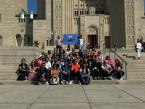The Vineyard has long been a small stage for many of the national issues of the day, and perhaps none more so in recent years than immigration. Starting about twenty-five years ago, a large number of Portuguese-speaking Brazilian people began moving to the Island, where they found jobs and formed their own community.
Since the U.S. Census does not count people from Brazil as an ethnic group, the number of Brazilians living here remains a matter for speculation. But we don’t need hard numbers to feel their influence — in our food, customs, religion and language. Portuguese is spoken in churches and in health care centers. In the public schools all notices that go home to parents are written in two languages.
There has been backlash too, with resentment and at times ugly racism directed at the Brazilian Islanders. No doubt this has been a factor in the continuing isolation of the Brazilian community. Although now in its second generation, that community is still largely perceived as an island unto itself, isolated from the mainstream Vineyard community.
Public school enrollment is at record levels among students for whom English is a second language. The vast majority of these students are second generation Portuguese-speaking Brazilians who were born in the U.S. and therefore are naturalized citizens. That children of immigrants still speak Portuguese as their first language is a window into the ongoing isolation of this particular community.
It’s a circular issue: the language barrier leads to isolation and the isolation perpetuates the language barrier.
But inroads are being made, and one is the English Language Learner program for non English-speaking students in the Vineyard public schools. Led by dedicated teachers committed to excellence in education, the program is seeing tangible results. Students who enter the program speaking only a few words of English are gaining fluency. That is to be applauded.
A story in the Gazette last week about the English Language Learner program triggered an outpouring of nasty comments, some suggesting that the existence of an ELL program is evidence that America is in trouble. On an Island with a long, proud history of tolerance, that point of view is in itself troubling.
Our country of course was founded by immigrants and the Island itself was settled by a large community of Portuguese immigrants in the early twentieth century, many of them fishermen from the Azores. That community assimilated long ago and the Island today celebrates its Portuguese heritage in myriad ways.
Has our nation gone soft because we now help people who move here to learn English instead of forcing them to figure it out on their own? Are Brazilians less deserving than Azoreans because they fill service, not fishing jobs? Are the Brazilians resisting integration or do they just not feel very welcome?
The answers aren’t always clear-cut, but it seems hard to argue with a program that teaches students the one thing they need most to succeed in America. The cost of not having this essential education is many times more detrimental to society than what we pay for it.







Comments (3)
Comments
Comment policy »